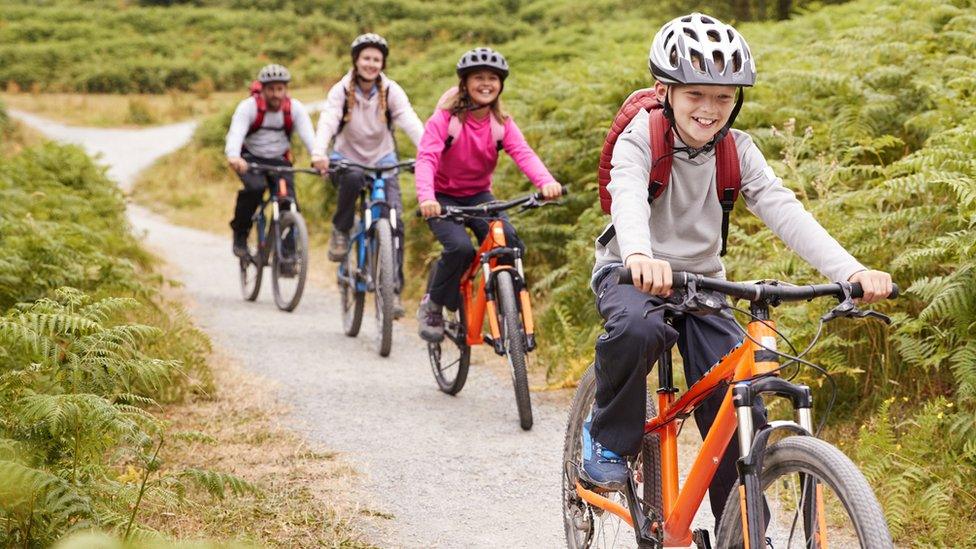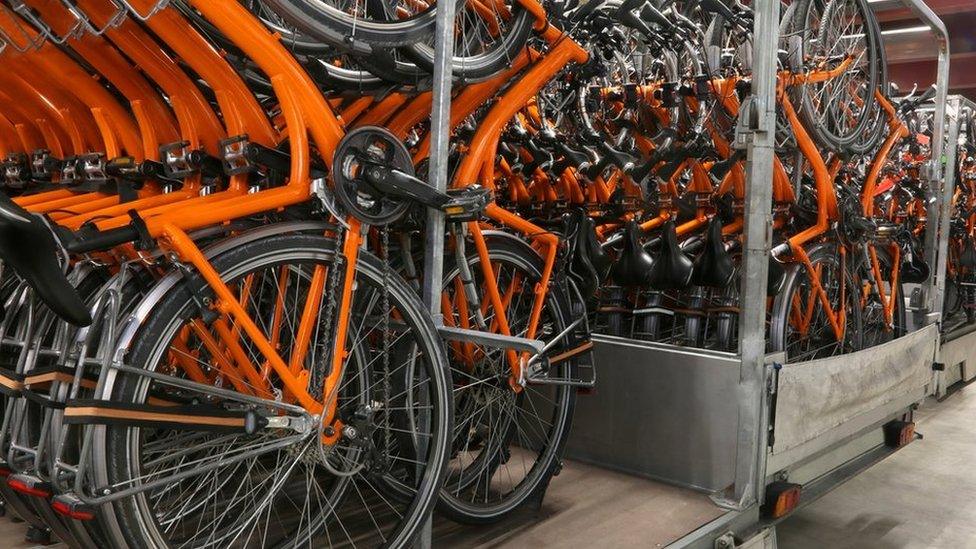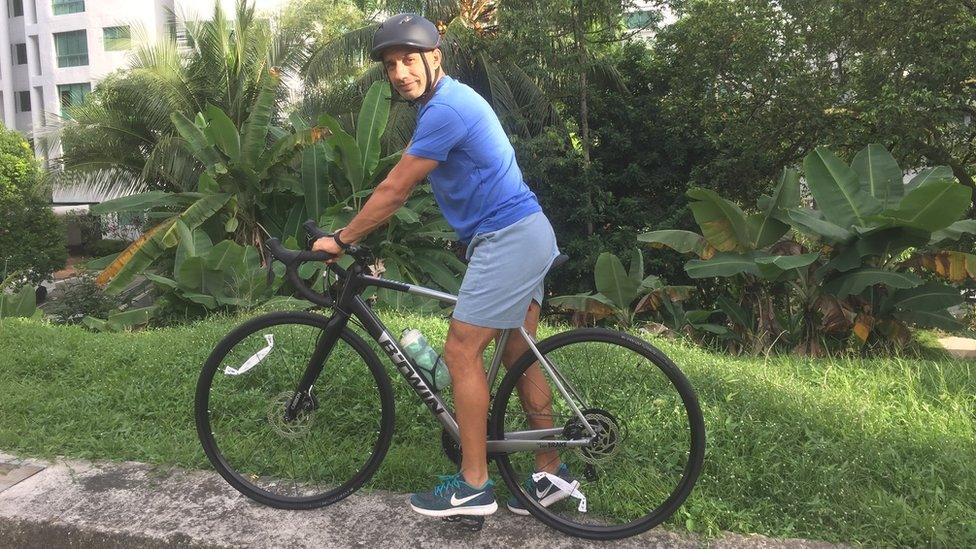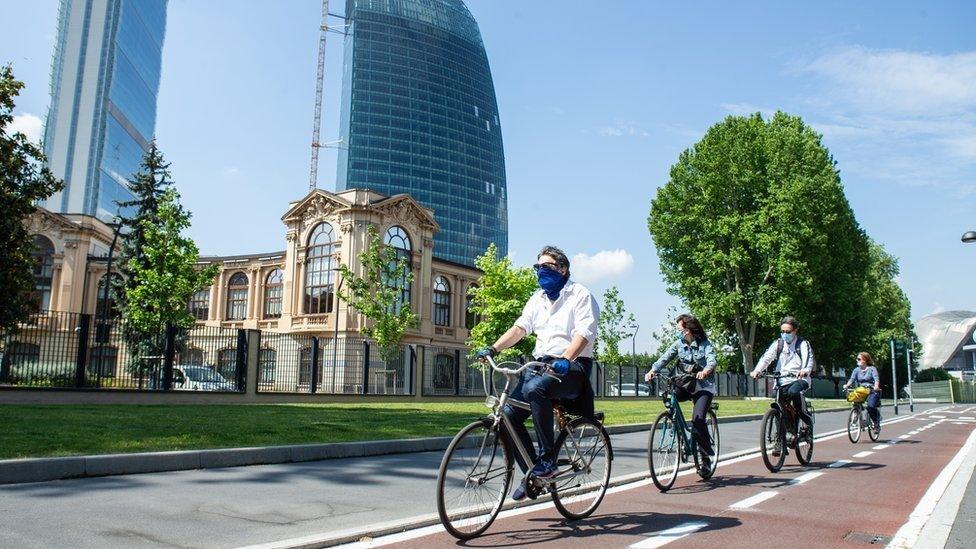Will Santa have enough bikes for Christmas Day?
- Published

Bike sales have soared across the world this year, as more people have taken up cycling
Bikes have been in hot demand this year as countries went into Covid-19 lockdowns the world over. The problem now is will there be enough to go around this Christmas?
While bicycle sales shot through the roof as people took to exercising outdoors or commuting to work by pedal power during the pandemic, manufacturers struggled to keep up as factories were temporarily shut down, leading to a worldwide shortage.
This mismatch between rocketing demand and dwindling supply led to empty floors in bike shops, leaving many disappointed customers.
While some countries have been able to relax restrictions, and production is generally back up to pre-Covid 19 levels, many bike brands still have huge backlogs to deal with.
The timing is bad as Christmas is one of the busiest periods for manufacturers, as millions of children (and adults) put bikes on their wish lists.

Some manufacturers have warned of bike shortages this Christmas
"There has been huge interest in cycling as the public seek alternatives to public transport and as a way of keeping fit," says Paul Tomlinson, cycling director of UK chain Halfords.
"And as a result we've seen a massive surge in demand, with sales of bikes and cycling products up."
During the spring and summer, the retailer temporarily sold out of some models. This came as industry-wide bike sales in the UK from April to June were 63% higher than the same period in 2019., externalWill Santa have enough bikes for Christmas Day?
Like the majority of products nowadays, most bikes are made using parts sourced from all over the world, and particularly from Asia.
For example, Japanese bike components firm Shimano supplies gear systems and brakes for a wide range of brands. And China, often called the "world's factory", is a major supplier of both bikes and parts.
Taiwan's Giant is recognised as the largest bicycle manufacturer in the world, and it saw demand skyrocket during lockdowns. The company has a number of facilities in China, and suffered production delays at the beginning of the year following the initial outbreak.
It was not alone. UK brand Raleigh, which makes the majority of its bikes in Europe, also had to deal with temporary factory closures.
"As a result, there have been delays in products coming to the market, but the consumer appetite for bikes remains high," says Lee Kidger, Raleigh's UK managing director.

Manufacturers say they are working hard to boost supplies
US-based Alta Cycling makes and distributes a handful of well-known brands including Diamondback and Redline.
"At first [during the pandemic] the entry-level price point bikes were what sold the fastest, but over time we ended up selling almost every bike we had, which included e-bikes, road bikes, gravel bikes, mountain bikes, and hybrid bikes," says company spokeswoman Jill Nazeer.
"Since bikes sold so quickly, all bike companies and component suppliers are doing their best to work with factories to build bikes as quickly as possible.
"The normal supply chain doesn't work that fast, so we are all working together to make sure our consumers and bike shops have the supply they need, as soon as we can get it to them."
Halfords says it has a diverse supplier base across the world, and is "working increasingly closely with our suppliers to meet the demand as more consumers take to cycling in the UK".
It has had tens of thousands of customers on waiting lists for deliveries.

Cycling is fun for both the young, and the young-at-heart
"Stock is being regularly replenished, and we have hundreds of thousands of bikes coming in over the next few weeks as we get ready for Christmas," says Halford's Mr Tomlinson.
"They arrive in the UK 85% pre-assembled, and our 450 stores have highly skilled bike mechanics who are on hand to make sure these bikes are ready to ride for the customer."
Bikes, for both children and adults, "appear to be one of the most wanted Christmas presents this year and early indications are that parents are shopping early so they don't miss out," he adds.


New Economy is a new series exploring how businesses, trade, economies and working life are changing fast.

But Raleigh's Mr Kidger warned about a potential Christmas crisis for the industry, and expects delays in manufacture to continue to have a knock-on effect.
"As consumers begin ticking off their Christmas shopping lists, there will likely be a shortage of bikes leading up to Christmas," he says.

Journalist Justin Harper, the writer of this article, has himself got into cycling this year
Alta Cycling's Ms Nazeer echoes that warning. "There will definitely be less bikes in stock than we'd normally have for the holidays," she says.
Meanwhile, some manufacturers have already sold out of all the bikes they can deliver in time for Christmas, such as the UK's Pashley Cycles, based in Stratford-upon-Avon.
"We stopped taking orders for Christmas during September, and are currently now quoting after Easter for new orders," says Neil Davis from the company.
The 94-year-old firm says it was able to get production back on track quickly after the first lockdown, but delays remain in sourcing parts.
"Cycle components are a global business and we have seen some supply chain issues," says Mr Davis.

Will the popularity of cycling continue to grow?
Looking ahead into 2021, the question is whether bike sales will continue to shoot up, or return to normal levels after Covid-19 eventually passes.
One report estimates the growing popularity of cycling will only continue. UK sales are predicted to exceed £1bn by 2023, up from £842m this year, according to the study by market research company Mintel., external
Alta Cycling's Ms Nazeer hopes the increased popularity of cycling in the US is also here to stay. "We certainly hope that this is the beginning of a trend in the United States where people will look to their bikes as an alternative to driving or public transit," she says.